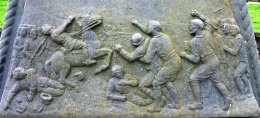I gave some examples of attacks directed at tax offices, some examples of attacks on the apparatus of taxation, some examples of tax resistance campaigns using particularly humiliating violent attacks against individual tax collectors, some examples of attacks directed at the property of tax collectors, some examples of direct violent attacks on individual tax collectors, and some examples of attacks and intimidation aimed at tax system collaborators.
Today I’ll continue our look at the violent side of tax resistance campaigns by giving some examples of attacks on police and soldiers when they attempt to enforce tax laws or to take reprisals against resisters.
- , a crowd of people on the Greek island of Hydra attacked local police after they detained a restauranteur for tax evasion:
[T]he inspectors wanted to transport the restaurant owner to Athens, an hour’s ride away by fast boat. They were set upon by a local crowd, which also attacked the boat’s crew.
The police, along with the restaurant owner, had to retreat to the island’s police station, which was besieged until riot police arrived . Locals cut off the station’s electricity and water supplies.
- In , protesters in China “overturned police cars and blocked roads over plans to more strictly enforce payment of taxes.” In another mob of tax protesters in China destroyed ten police vehicles including an armored car.
- There were battles between police and protesters during the Poll Tax rebellion in the Thatcher years.
In Bristol, the crowd charged the police and rescued arrested demonstrators.
“One police officer was kicked unconscious when he tried to make an arrest.
Six more were dragged out of their van.”
In London, “As the police baton-charged the crowd… they were resisted by a hail of bricks, bottles, and stones.”
Police brutality turned a peaceful demonstration into a riot in Trafalgar Square.
“Mounted riot police baton-charged the crowd.
The crowd, angered by this violent provocation, retaliated by throwing sticks, banner poles, bottles — anything they could find.
Young people, armed only with placards, fought hand to hand with police.
… As the missiles began to rain down the police retreated:
More than 100 police officers would be treated for injuries sustained during the riot. A spokesman for the police said, “I have never seen such sustained and savage violence used directly against the police.”…Pedestrian isles were being torn up and real serious lumps of concrete being thrown at the romper-suited police. I found myself with rock in hand. The first I threw was aimed at a group of police. I watched it bounce off a shield. My second rock was more specifically aimed at their front line. Again, it was well-deflected. I saw a rock strike a policeman’s visor and he didn’t even blink. The police were shielding themselves from the missiles raining down, but they were vulnerable to rocks aimed at their legs and midriffs. The police were taking a battering. Every now and then a policeman would crumple to his knees and the crowd would roar.”
- During the Poujadist tax rebellion in France in , “unabashed Poujade vigilantes went right on chasing tax collectors down the roads, mobbing police and defying troops assigned to escort them.”
- At the tail end of the Dharsana Salt Raid, some Indian nationalist sympathizers, disregarding Gandhi’s guidelines and “abandoning, it was said, all pretenses at non-violence, stoned guards and police. Five police and three excisemen were injured by the pebbles. Six police who went to the rescue of some hardly pressed excisemen were themselves surrounded by the mob and obliged to retire.”
- In Spain in , when guardsmen tried to disperse protesters angry at the arrest of a tax resisting cattleman, the crowd fought back — “two persons were killed and five wounded. Among the latter is a Sergeant of the Civil Guard.”
- After the Russian duma-in-exile issued a tax resistance manifesto, the government said that if people refused to pay taxes, it would send in troops who would show no mercy. “Without waiting for soldiers to put the threat of the government into execustion the peasants have inaugurated a campaign of guerrilla warfare against the troops already in the province. … Within the last few days a number of military sentinels have been shot down in ambush or attacked by the peasants.”
- In , the military were called in to Guerrero, Mexico, to put down a tax rebellion. Instead, the rebels defeated the troops and took General Ranjel prisoner.
- “Half-breeds” (people of mixed European immigrant and Native American parentage) in the Dakota Territory refused to pay taxes in . When the Sheriff tried to collect, “the half-breeds assembled from all directions, and pressing about the Sheriff and his one man they forced him to surrender his well-earned pittance of taxes … and say they will resist to the last man. Sheriff Flynn has been notified that he will be shot on sight if he again makes a similar attempt.”
- “When a deputy sheriff went to make seizures” against Irish settlers in Canada who were resisting taxes in , “the residents threatened to string him to the nearest tree. Finally, they compelled him to eat the writs he had, and then gave him a limited time to get out of the township.”
- A sheriff trying to enforce the “foreign miners tax” in California “in attempting to compel the foreigners to yield, was killed by them, and one or two of his posse wounded.”
- The Rebecca Rioters in Wales targeted the constables who tried to stop or investigate the riots, or to conduct tax seizures:
- Two or three hundred Rebeccaites met at a Pontyberem village, and while there “made some special constables promise not to serve, and took away their staves.”
- “They then attacked the house of the blacksmith, who had previously said he would face fifteen of the best Rebecca boys, and who also had been sworn in as a special constable; according to his own statements he was a man devoid of fear. The smith — fearless man of Vulcan — had, however, departed; but smash! went in his door and windows, and his deserted smithy was practically destroyed.”
- “At the outset of these proceedings the toll-man ‘Dick’ contrived, by running over ditch and dell, to warn a parish constable, one Evan Thomas, otherwise ‘The Porthyrhyd Lion,’ of his own mishap, as well as the peril to which he thought him exposed, Evan being somewhat unpopular in the neighbourhood. On receiving this hint, away bolted ‘Ianto,’ scampering over the ditches and fields until he found a cow-house where he lay concealed in anxious suspense the remainder of the night. Notwithstanding the retreat of ‘Ianto,’ about seventy of the tribe visited his domicile, smashed in his windows and doors, destroyed his shelf and dresser, and all his crockery, as well as the spokes of a new cart, put a cheese on the fire, cut down some of the trees in the garden, and then simultaneously raised the cry, ‘Alas! poor Ianto!’ … Evan the constable… if found, was to have his ears cut off.”
- “These riotous proceedings caused considerable excitement and alarm… The different persons in the neighbourhood who were sworn in as special constables… gave up their staves, with the determination of refusing on any future occasions to interfere with the movements of Rebecca or the protection of the toll-house.”
- “John Evans and John Lewis, two Sheriff’s officers from Carmarthen, were sent… to make a distress on the goods and chattels of William Philipp… They were attacked by about twenty-five of the ’Beccas, and beaten in a dreadful manner.… John Evans was compelled to go on his knees before them, and put the distresses and authority to distrain in the fire. He was then made to take his oath on the Bible, which one of them put in his hands, that he would never again enter the premises to make another distress. He was compelled to make use of the following words: ‘As the Lord liveth, and my soul liveth, I will never come here to make any distress again.’ After taking the oath, he was set free, and the two bailiffs returned to town.”
- William Chambers, who led a police unit that wounded and arrested some Rebeccaites, was targeted multiple times. On one occasion, a stack of his corn was burned, on another, a stack of straw met the torch. Later his farm and outbuildings were all engulfed in flames. A horse of his that had been rescued from another of his farms as it burned down was later shot.
- During the Tithe War in Ireland, British troops killed 18 resisters who were trying to reclaim distrained livestock.
In return, the resisters killed 18 troops in an ambush:
A number of writs against defaulters were issued by the Court of Exchequer, and intrusted to the care of process-servers, who, guarded by a strong force, proceeded on their mission with secrecy and despatch. Bonfires along the surrounding hills, however, and shrill whistles through the dell, soon convinced them that the people were not unprepared for hostile visitors. But the yeomanry pushed boldly on: their bayonets were sharp, their ball-cartridge inexhaustible, their hearts dauntless. Suddenly an immense mass of peasantry, armed with scythes and pitchforks, poured down upon them — a terrible struggle ensured, and in a few moments eighteen police, including the commanding-officer, lay dead. The remainder fled, marking the course of their retreat by their blood… In the mêlée, Captain Leyne, a Waterloo veteran, narrowly escaped. A coroner’s jury pronounced “Wilful murder.” Large Government rewards were offered, but failed to produce a single conviction.
- In Issoudun, France in , a general who was sent to try to quell a tax rebellion there “entered the town only through a capitulation; the moment he reached the Hôtel-de-Ville a man of the Faubourg de Rome put his pruning-hook around his neck, exclaiming, ‘No more clerks where there is nothing to do!’ ”
- During the Fries Rebellion in the early United States, “it came to the knowledge of the authorities that several of the magistrates themselves were disaffected, and others were prevented doing their duty through fear of injury.”
- During the French Revolution, when the people of Peronne and Ham got wind that an order had been issued to rebuild destroyed toll-houses, they destroyed the soldiers’ barracks. In another case: “M. de Sauzay, commandant of the ‘Royal Roussillon,’ who was bold enough to save the [tax] clerks, is menaced, and for this misdeed he barely escapes being hung himself. When the municipal body is called upon to interpose and employ force, it replies that ‘for so small a matter, it is not worth while to compromise the lives of the citizens,’ and the regular troops sent to the Hôtel-de-Ville are ordered by the people not to go except with the butt-ends of their muskets in the air.”


